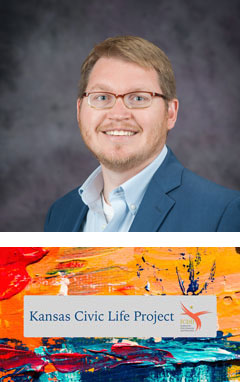November 12, 2020
Shaffer receives Sunflower Foundation grant to study civil discourse
Submitted by Timothy J. Shaffer

Timothy J. Shaffer, associate professor of communication studies and director of the Institute for Civic Discourse and Democracy, has been awarded a $115,000 Sunflower Foundation grant to assess how and where civil discourse practices are being deployed across the state and fortifying the infrastructure needed to increase uptake of civil discourse strategies and concepts in Kansas communities and local organizations.
The Kansas Civic Life Project is an engaged research project that enables Kansans to identify individuals and groups in their communities, regions, or across the state who have the ability to facilitate difficult public discussions around a host of challenging issues using civic discourse.
"As we confront significant political polarization and partisanship within our communities, workplaces, and even families, the necessity of being able to find constructive ways to engage differences is apparent," Shaffer said. "Surveys highlight the sense of frustration with such polarization, but we also know that local communities are often the environments in which people can work across difference because politics is no longer out there but is, instead, tangible and immediate. The Kansas Civic Life Project is an attempt to understand and, proactively, help build up the civic structure of Kansas to support efforts to work on shared public problems as citizens, together."
The project is comprised of two research and engagement elements: to understand and assess the ways in which various individuals, organizations and communities across the state are using public engagement approaches that are rooted in different dialogue and deliberation models; and build civic infrastructure in Kansas to better understand and use civic discourse. A statewide map is available for public access and will be updated continuously with additional practitioners. If you engage in community-based discussions about issues in your professional role or as a volunteer, you are encouraged to complete a brief survey in order to be included on the map.
Because of COVID-19 and its impact on face-to-face engagement, many efforts originally planned for 2020 have been redesigned for implementation in early 2021 using technology for distance learning and engagement.
